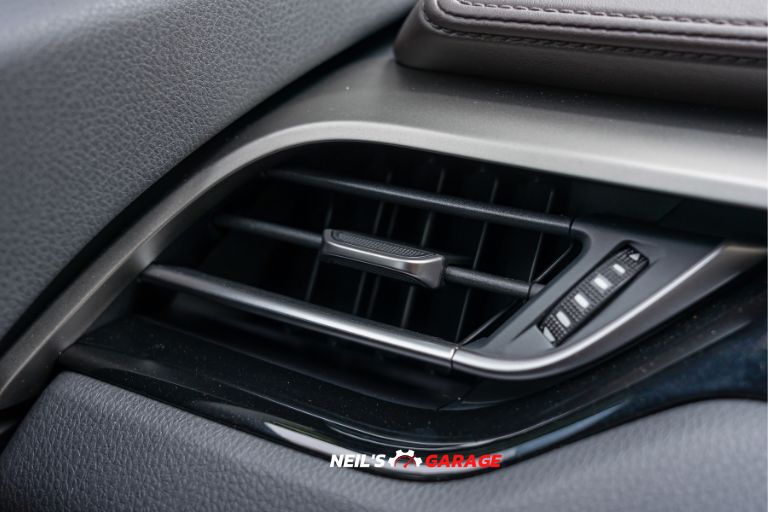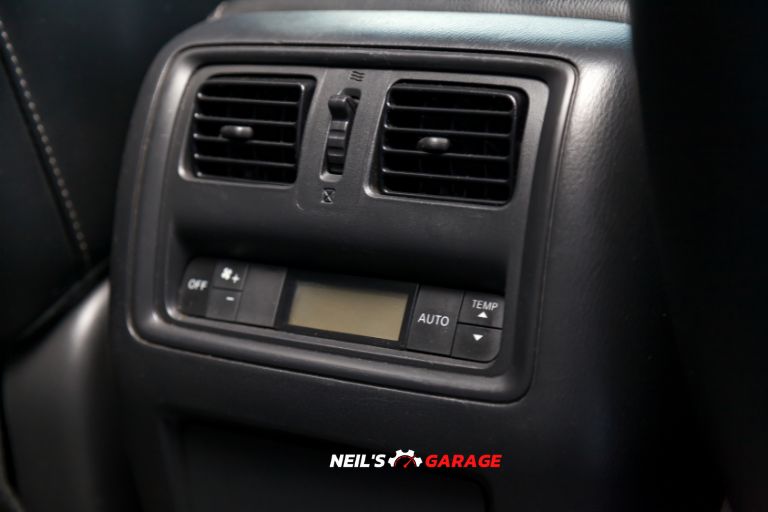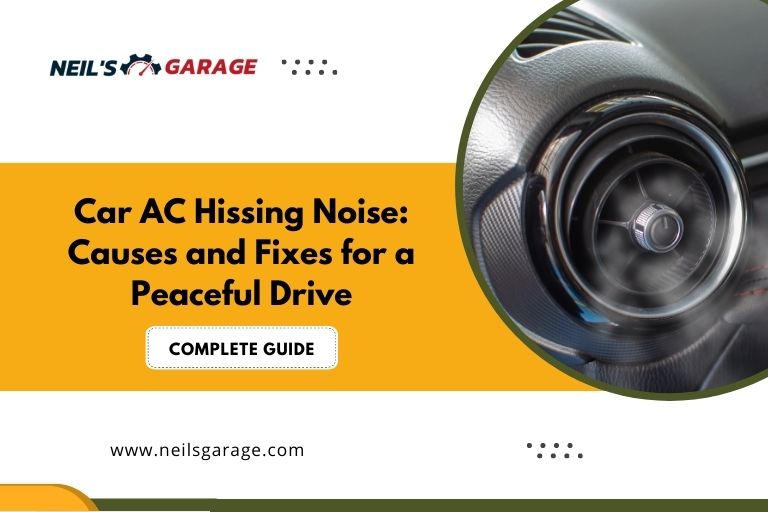Have you ever turned on the air conditioner in your car on a hot day only to hear an obnoxious hissing sound? In such a case, you are not alone!
In this blog article, we will examine the frequent causes of this annoying problem, the hazards it could provide, and the practical fixes that will restore the refreshing breeze to your driving experience.
So, without further ado, let’s dive into the article.
Contents
- 1 Why does my car aC make a hissing noise when turned on
- 2 Different Scenarios When Car Air Conditioner Can Make a Hissing Noise
- 3 How to Diagnose a Hissing Noise in a Car AC System
- 4 How to Fix a Hissing Noise in a Car AC System
- 5 How to Prevent a Hissing Noise in a Car AC System When Turned on
- 6 Frequently Asked Questions
- 7 Conclusion
Why does my car aC make a hissing noise when turned on

As a car owner, you may be worried about why your car is making a hissing noise whenever it is turned on. It is important to note that there could be many possibilities for your car to make a hissing noise when turned on. Some of them could be:
Refrigerant Leak
Your car’s air conditioner may hiss and perform less effectively if there is a refrigerant leak because:
- Refrigerant can escape through the aperture and make a hissing sound if any parts have a fracture, hole, or loose connection.
- A refrigerant leak might reduce car AC system pressure, which impairs the compressor’s functionality and lessens the evaporator’s cooling capability. As a result, your air conditioner won’t be able to chill the air as efficiently as it once could.
- Due to corrosion, overheating, or freezing, a refrigerant leak can also harm other components of the Car’s AC system, such as the compressor, condenser, or expansion valve.
Also, Read: Car AC Leaking Water: Causes, Fixes, and Prevention Tips
Car AC Compressor Issues
A broken-down car AC compressor might also make a hissing sound because:
- The compressor may operate constantly or sporadically if the clutch is broken or damaged, making a hissing noise as the refrigerant passes through the system. The clutch may lock up or slip, generating heat and friction that might harm the compressor.
- A hissing sound may also be heard when the compressor fails to rotate due to worn-out or seized bearings. The bearings may also generate a grinding or screaming sound as they wear down.
- When the refrigerant seeps through the gaps or cracks in the compressor pistons or valves, it might make a hissing sound as well. Additionally, the banging or rattling sound that the pistons or valves make when they contact the cylinder walls or each other.
Expansion Valve Problems
The expansion valve controls refrigerant flow into the evaporator as part of the car AC system. If the expansion valve is leaky, blocked, or broken, it may make hissing noises.
Some signs of a faulty expansion valve include:
- The air conditioner is not operating normally and is warming up. A malfunctioning or stuck-open expansion valve may cause too much or too little refrigerant to enter the evaporator, resulting in this situation and impacting the effectiveness and functionality of the car AC system.
- Frost on the car AC evaporator or coming through the vents. This could occur if the expansion valve breaks down and too much refrigerant leaks into the evaporator. This may result in the evaporator freezing over or the formation of frost on the vents and may also lower the AC system’s ability to cool.
- AC compressor constantly running can also be a symptom of this problem. The compressor may pump refrigerant continuously through the Car’s AC system even when it is not necessary if the expansion valve malfunctions or becomes stuck open.
Condenser Problems
The car AC system may experience excessive pressure or have a refrigerant leak because of a broken or clogged condenser, which can produce a hissing sound.
It is located in front of the radiator and is open to incoming airflow. Because of this, it may be harmed by the impact of pebbles, debris, or other items or clogged by mud, dust, or insects.
If the condenser is broken or clogged, the flow of the refrigerant is restricted, which might raise the pressure within the car AC system. As the refrigerant attempts to leave through the damaged region or the relief valve, it may make a hissing sound.
A refrigerant line leak brought on by a faulty condenser is an alternative possibility that can also result in a hissing sound when the refrigerant leaks through the hole.
Evaporator Problems
The evaporator converts the refrigerant into a gas by absorbing heat from the surrounding atmosphere. Because of refrigerant leaks, blocked or damaged evaporator fans, or broken expansion valves, problems with the evaporator might result in hissing noises and inadequate cooling performance.
Internal Valve Leak
Internal valve leakage might be the root of the Car AC system’s hissing sounds. They happen when the valves that control the refrigerant’s flow and pressure are faulty or broken.
Symptoms of internal valve leaks include:
- Performance fluctuations of the air conditioner: If the refrigerant reaches the ideal pressure and temperature for cooling the air, there may be consistent cooling or decreased efficiency.
- Potential risks include the environment and human health due to the refrigerant’s potential to leak out of the system. Other components might be harmed or explode due to the compressor’s high pressure.
According to a study by the Society of Automotive Engineers (SAE), a leak in the refrigerant line is the most common cause of a Car’s AC making a hissing noise when turned on (SAE, 2019).
Different Scenarios When Car Air Conditioner Can Make a Hissing Noise

Car Air Conditioner Hissing When Off
There are a variety of reasons why your car’s air conditioner can hiss while it’s off:
- The car AC’s low refrigerant level might be one of the causes. As the refrigerant escapes from the system when the car’s Air Conditioning system is low on refrigerant, it will hiss.
- A hole in the car’s AC condenser is another potential cause of the hissing sounds. Every time your air conditioner starts up, it makes a hissing noise; this might be a sign of a refrigerant leak. This occurs automatically after your car is turned off. The hissing sound is emitted due to the system’s pressure equilibrating.
When turned off, it is not normal to hear a hissing sound from a car. It can indicate that anything is wrong with your car’s AC system. You should have a qualified mechanic examine it as soon as you can.
Car Air Conditioner Noise When the Compressor Is On
It may be due to uneven pressure or refrigerant flow in the system if your car’s AC compressor hisses while running. When the AC is on or off, a hissing sound may signal this.
It’s not typical for the car AC compressor in the car to hiss while running. It can be a sign that anything is wrong with your AC system. It is recommended to take your car for a professional inspection.
Car AC Makes Noise When Accelerating
The Car’s AC system may experience issues and hiss while being accelerated. High pressure inside the AC system is one potential reason for hissing sounds when accelerating.
Your car’s AC system shouldn’t hiss as you accelerate; this is not normal. It can be a sign that anything is wrong with your AC system.
Car AC Is Making a Hissing Noise and Not Cooling
If the air conditioner in your car is hissing and not cooling, there could be an issue with the system. Uneven pressure or refrigerant flow, an excessive amount of Freon in the system, or an issue with the compressor’s drive pulley bearing are potential reasons for hissing sounds in the car AC system.
It is not a good indicator of the health of your car. It’s crucial to get your car’s AC system examined by a qualified mechanic as soon as possible if your car’s AC is not cooling and making a hissing sound.
How to Diagnose a Hissing Noise in a Car AC System
To diagnose a hissing noise in a car AC system, follow the following steps:
Listen to the Noise and Identify its Source
The compressor, the refrigerant line, the expansion valve, or the evaporator are just a few examples of where the hissing sound might be coming from in the air conditioning system.
You need to securely listen to the car’s AC system operating to identify the noise’s origin. A mechanic’s hose or a stethoscope can magnify the sound and locate where it is coming from.
To facilitate the diagnosis, switch off any other loud parts, such as the fan, radio, or engine.
Check for Signs of a Refrigerant Leak
A refrigerant leak may also be the source of the hissing sounds, which might compromise the car AC system’s ability to cool efficiently.
Examine the coolant level and search for greasy residue around the car Air conditioning parts to check for a refrigerant leak. On the reservoir tank, the prescribed coolant level range should be followed.
The greasy residue can reveal the source of the refrigerant leak. You should take safety precautions when handling refrigerant, including donning gloves and goggles and avoiding touching or breathing it.
Inspect Car AC Components for Damage
Here is a step-by-step guide to inspecting the Car Air Conditioner components:
- Check the AC parts for damage: Cracks, holes, corrosion, or general wear and tear in the Car AC parts might be the source of the hissing sounds. You must do the following actions to check the AC parts for damage:
- A compressor check: The serpentine belt connects the compressor, which is situated in the engine compartment. Keep an eye out for damage indicators like cracks, leaks, or loosened connections. Additionally, check the compressor clutch by turning the air conditioner on and off while listening for a clicking sound.
- Examine the expansion valve: The evaporator is connected to the expansion valve, which is close to the firewall. Keep an eye out for deterioration indicators like corrosion, leaks, or blockages. The expansion valve may also need to be tested by examining how hot the input and output pipes are. They ought to be, respectively, chilly and warm.
- Verify the condenser: The compressor is connected to the condenser, which is situated in front of the radiator. Look for damage indicators, including bending, dents, leaks, or debris. Use compressed air or a soft brush to clean the condenser fins to increase airflow.
- Examine the evaporator: Check for damage indicators like mold, leaks, or frost. To get rid of dust and grime, you can use a spray cleaner or a vacuum cleaner to clean the evaporator coil.
Also, Read: Car AC Suddenly Stopped Working? Troubleshooting Tips to Fix It
How to Fix a Hissing Noise in a Car AC System
#1. Repair or Replace the Problematic Component
A broken compressor, a refrigerant line leak, a damaged evaporator fan, or an expansion valve might be the source of the hissing sounds. Tightening loose connections, clearing clogged filters, and lubricating moving parts are a few straightforward maintenances that you can carry out on your own.
For complicated repairs, it is recommended to seek expert assistance depending on the complexity and location of the issue.
#2. Recharge the Car AC System with Refrigerant
The hissing sounds may also warn that the system’s refrigerant levels are low. This can ultimately result in reducing cooling effectiveness and efficiency. You must recharge the system using a refrigerant kit or a professional service to restore the optimum refrigerant levels. Utilizing a professional service is advised to prevent overcharging or leaks, which might harm the system or the environment.
How to Prevent a Hissing Noise in a Car AC System When Turned on

#1. Regular Car AC System Servicing
Having your car’s AC system routinely maintained by qualified mechanics is one of the greatest strategies to prevent a hissing problem. They may carry out normal duties like monitoring the refrigerant level, inspecting parts for damage, and changing worn-out components. Regular maintenance can assist you in identifying and resolving faults before they worsen and produce a hissing noise or other difficulties.
#2. Inspecting for Leaks and Damage
Inspecting your car’s air conditioning system regularly for leaks and damage is another technique to stop a hissing problem. You might search for clues such as greasy buildup, holes, fractures, corrosion, or frost around the car AC parts. You may also feel for temperature variations in the refrigerant lines or listen to odd noises coming from the pipes. To prevent additional issues, you should get any leaks or damage fixed as soon as you see them.
#3. Keeping the Car’s Air Conditioning System Clean
Maintaining the car AC system’s cleanliness is a third approach to stopping your car’s air conditioning system from hissing. The evaporator coil and condenser fins can be cleaned using a soft brush or compressed air. You may also use a spray cleaner or a vacuum to clean the air vents and filters of dust and grime. Maintaining a clean Air Conditioning system may increase its performance and lower the possibility of harm.
Also, Read: Does Car AC Use Gas? Fuel-Saving Strategies
Frequently Asked Questions
Can I drive my car if it is hissing?
No. Your car’s engine can overheat if you hear a hissing noise coming from the front. Driving is not advised if your car is hissing.
Is it normal for car AC to make noise?
Yes. Noise from a car air conditioner is rather common1. However, some noise suggests that the system components may have a deeper issue. Rattling, hissing, banging, clicking, screaming, shrieking, and buzzing noises indicate a system issue with one or more components. It is important to have your car’s AC examined by a qualified mechanic if you hear any of these noises to prevent long-term harm to the vehicle.
How much does it cost to fix the hissing noise in Car Air Conditioner?
The cost of repairing hissing noises in car air conditioning can vary depending on the cause of the problem. If the problem is caused by a simple remedy, such as a filthy air filter or a loose hose, the cost might be reasonably modest, ranging from $50 to $200. However, it might cost up to a few thousand dollars if the issue is more serious and calls for significant repairs.
Conclusion
In conclusion, a hissing sound coming from a car’s air conditioning system can be caused by several problems, including refrigerant leaks, compressor issues, expansion valve issues, condenser damage, evaporator problems, and internal valve leaks.
These issues may result in decreased cooling effectiveness and possible dangers. While DIY solutions are feasible for smaller issues and proper diagnosis is essential, seeking expert assistance for more difficult repairs and refrigerant recharge is advised.
Regular maintenance of the AC system checks for leaks and damage, and regular cleaning of the parts are crucial for prevention. The hissing noise should be promptly addressed to maintain a comfortable and secure driving experience during hot weather. Proactive maintenance and prompt repairs can increase lifespan and preserve the AC system’s functionality.
Also, Read:
